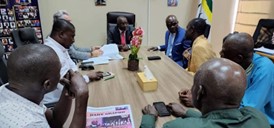The arrest and detention of former House Speaker J. Fonati Koffa and three other Representatives on charges of arson and attempted murder have ignited a firestorm of controversy in Liberia, raising concerns about political motivations and judicial independence. Koffa’s colleagues in the Grand Kru County Legislative Caucus have vehemently denounced his detention, asserting that the charges are bailable and that his continued incarceration is unwarranted. They argue that Koffa poses no flight risk and demand his immediate release, emphasizing the need for a free, fair, and impartial trial. The caucus views the ongoing legal proceedings as a troubling moment for Liberian democracy and stands firmly in solidarity with their colleague.
The charges against Koffa and Representatives Jacob Debee, Dixon Seboe, and Abu Kamara stem from a December 2024 fire that significantly damaged the Liberian Legislature’s Joint Chambers. While the court granted medical dispensation to Representative Prescilla Cooper, a request for similar consideration for Representative Abu Kamara, who reportedly suffers from high blood pressure, was denied. This disparity in treatment has further fueled accusations of political bias, with supporters and allies of the accused lawmakers contending that the charges are politically motivated and orchestrated by the Unity Party-led government to target opposition figures.
The court’s decision to hold the four lawmakers without bail has sparked widespread protests and intensified an already charged political climate. Demonstrators gathered outside the Monrovia Central Prison over the weekend, accusing the government of conducting a political witch-hunt. In response, the Liberia National Police increased security measures, erecting barricades around the prison. The case has become a focal point for both opposition leaders and civil society organizations, who are closely monitoring the legal proceedings and their implications for Liberia’s judicial independence and overall political stability.
The Grand Kru County Legislative Caucus’s demand for Koffa’s release centers on the argument that the charges against him are bailable and that his continued detention is unjust. They maintain that Koffa, a prominent political figure with deep ties to the community, presents no flight risk and should be afforded the presumption of innocence until proven guilty. They have called on the Ministry of Justice to respect Koffa’s rights and ensure that due process is followed without the undue burden of continued imprisonment. Their statement underscores the caucus’s deep concern about the potential erosion of democratic principles and the perceived targeting of political opponents.
The unfolding legal drama surrounding the four lawmakers has exposed deep political divisions within Liberia and raised questions about the impartiality of the judicial system. The denial of bail, coupled with the differing treatment of Representatives Cooper and Kamara, has fueled suspicions of a politically motivated prosecution. The government’s response to the protests, with increased security measures around the prison, has further heightened tensions. As legal proceedings continue, the case is poised to serve as a critical test of Liberia’s commitment to the rule of law and the independence of its judiciary.
The case against Koffa and his colleagues is unfolding against a backdrop of political maneuvering and power struggles within Liberia. The accusations of arson and attempted murder are serious, and the government has a responsibility to investigate and prosecute such crimes. However, the perception of political bias in the handling of the case threatens to undermine public trust in the justice system and exacerbate existing political tensions. The coming days and weeks will be crucial in determining whether Liberia can navigate this challenging situation and uphold its commitment to democratic principles and the rule of law. The international community will be closely observing the proceedings and their impact on Liberia’s stability and democratic trajectory.














